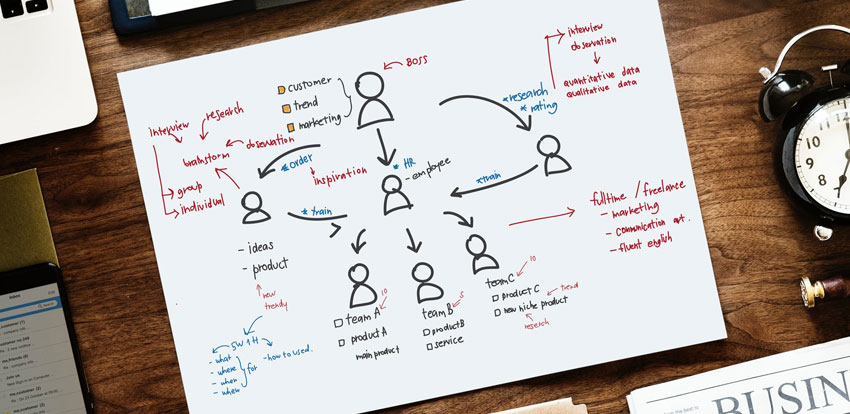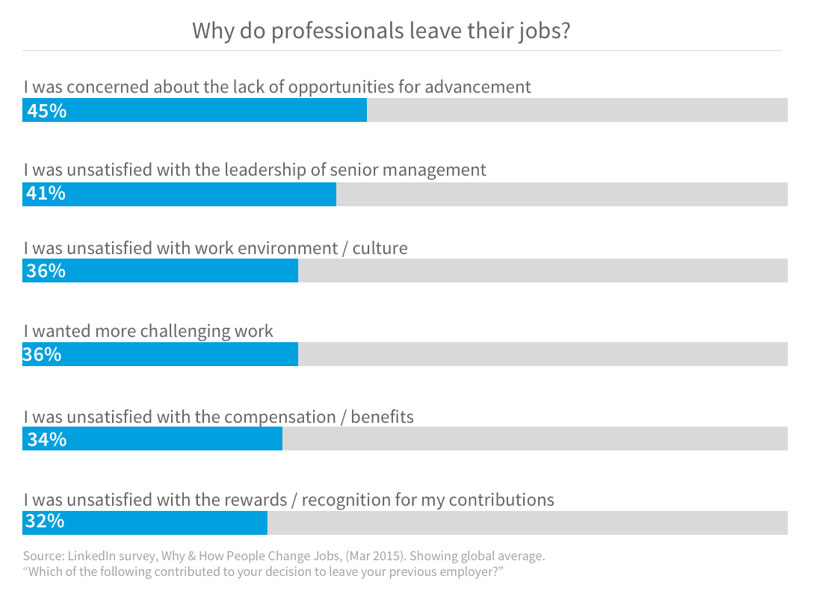
Every employer owes it to their employees, and themselves, to create a career plan for their team. A successful career plan provides opportunity for growth and development so that employees can feel fulfilled and satisfied with their work, which in turn builds loyalty and trust in the company and improves productivity. For these reasons, creating an employee career plan is considered an investment not only in employees, but also in the company.
When creating a career plan, it is important to consider an individual’s skills and ability to make sure they are provided with appropriate work that will be rewarding and beneficial for both the employee and the company.
Here are some ways you can create effective career plans for your employees in 2022.
Don’t take your employees for granted, especially not high-performing ones who might seem happy but are always just a click away from a new job.
A number of studies, including LinkedIn’s Why & How People Change Jobs report found that the top reason people leave their jobs is a lack of opportunity for advancement. People want career growth. And when they don’t get it, they leave. So, if you’re managing a department and don’t have a career development plan for everyone in it – you’re playing with fire.

But companies don’t prioritize career planning. The Society for Human Resource Management (SHRM) found that the growth and development needs of employees are not a typical priority in many workplaces.
They also found that every time a business replaces a salaried employee, it costs 6 to 9 months’ salary on average. For a manager making $40,000 a year, that’s $20,000 to $30,000 in recruiting and training expenses!
So, even if career plans aren’t important to your organization, they should be to you – you’re the one who has to pick up the pieces each time a team member resigns or worse, becomes an under-performing employee.
It’s much better to encourage and grow your employees before they become disengaged!
Here are some tips for conducting effective career planning meetings with your employees:
Give employees time (and guidance) to prepare properly
Before you sit down for a formal meeting to develop a career plan with an employee, ask them to do some preparation. For example:
- Ask them to think about what they want to have accomplished in five years’ time (this will give you something to create a plan around).
- Ask them to take a look at their job description and think about how they want to progress in the next 12-24 months.
- Ask them to think about what type of path they want to take. Do they want to specialize or move into management?
- Ask them to conduct a SWOT analysis on themselves. How can they create a career plan that plays on their strengths, works on their weaknesses, and take advantage of opportunities?
Help employees turn their career goals into actions
Hopefully your employees get to discuss their career goals and progress with you regularly so that nothing in the formal meeting comes as a huge surprise (annual performance reviews are not enough!).
Use the meeting to find out how they’re currently feeling about their job. Before discussing the preparation work you asked them to do, you can get the discussion going by asking questions such as:
- Are you happy with your current responsibilities?
- Is your job description still relevant?
- What aspects of the job do you love the most and least?
- Are you excited about your career path here?
Then talk about their “Dream career” and use their SWOT analysis and your team KPIs to help them develop a career plan that works for them and the company. You could start with a 5-year plan, and then work backwards to 3-year and 1-year goals.
Once you have clarified a few short-term goals, help your employee to think about the projects, tasks, and learning opportunities they would need to complete in order to reach them. You can use these to create quarterly action plans.
Other ways to help employees reach their career goals
Connect them to potential mentors
Once you have a clear understanding of the career path they aspire to, you can help them learn by example – by introducing them to someone who has already walked the path. A mentor doesn’t necessarily need to work for your organization. External mentors can be just as inspiring.
Encourage them to take on new projects
Is there a project coming up that would help them grow? Sometimes these projects are cross-functional or in different department all together. Thinking out of the box can help your employee gain valuable exposure and encourage them to think innovatively (Internal gig boards are great for promoting this type of experience!).
Create a culture of continuous learning
Every career planning meeting should include plans for learning. This could include asking the employee to put together a proposal for formal training, accreditation or conference attendance. If budget is a problem, ask them to think about other avenues for learning, for example through online courses (Microlearning is increasingly being used by organizations to upskill their people), job shadowing, or reading. You might be able to help by giving them a relevant book to read and discuss with you each quarter.
Make sure employees know that their career development is their own responsibility
After the meeting, ask your employee to finalize their career plan and document it for you. Make it clear that, while you will do everything in your power to help them succeed, this is their plan and they are responsible for their own career growth.
Considerations for managers
Be prepared
Before the meeting, make sure you understand company policies, find out what your training budget is, identify potential mentors, and think carefully about the employee’s strengths and weaknesses.
Be honest
As a manager, it’s your job to be straight with your employees. If there is no chance of a promotion or pay rise in the short term – tell them. And help them gain experience in other ways, even if it means a lateral move.
You also need to be honest about whether the employee has the skills to get the promotion they’re working towards.
Be engaged all year
Employee career planning conversations shouldn’t happen once a year. Show your employees that you care by pointing out opportunities throughout the year, congratulating them when they accomplish a task, and course-correcting as soon as they make a mistake. This will lead to greater employee engagement and quicker progress.
Develop skills and career paths with vi
Research shows that employees thrive when they clearly understand the skills needed to grow and can follow a directed career path.
Use vi’s skills and career development solution to give each employee a personal vision of success, enable them to take a pro-active approach to their own development, and show them the path to success.
Create tailored career roadmaps
vi’s skills and career development solution ensures that each employee understands which skills they need to master in order to progress at your organization
Maintain momentum
Enable people to track their own progress by giving them access to a visual report that tracks their daily progress
Focus on the correct outcomes
Help managers work out how best to support and guide employees, identify the most suitable training programs, and ensure that mentorships are focused on the right outcomes.
Identify skills gaps
Collect real-time information on the skills acquired or in development across the organization. Use this information to guide planning and address skills gaps.